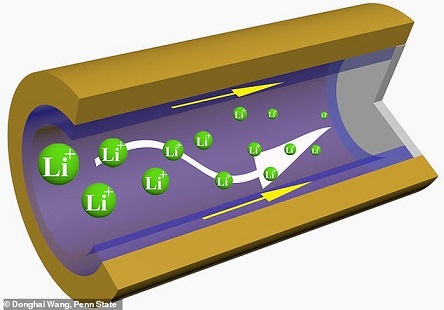A 3D cross-linked polymer sponge that attaches to the metal plating of a battery anode could lead to lithium metal batteries that last longer, charge faster and are safer.

This is the claim of researchers from Penn State University whose findings have been published in Nature Energy.
next generation of metal batteries
“This project aims to develop the next generation of metal batteries,” said Donghai Wang, professor of mechanical engineering and the principal investigator of the project. “Lithium metal has been tried in batteries for decades, but there are some fundamental issues that inhibit their advancement.”
Fast-charging scenarios – such as with electric vehicles – put lithium ion (Li) batteries under additional strain that leaves them vulnerable to dendritic growth, which are needle-like formations that can reduce cycle life and potentially cause catastrophic safety issues.
polymer on the interface of Li metal
“Our approach was to use a polymer on the interface of Li metal,” Wang said. The material is said to act as a porous sponge that not only promotes ion transfer but also inhibits deterioration.
“This allowed the metal plating to be free of dendrites, even at low temperatures and fast charge conditions,” he said.
Wang, who is an affiliated faculty member at the Penn State Institutes of Energy and the Environment (IEE), also belongs to the Battery Energy and Storage Technology Center (BEST), a research institute in energy storage.
A critical component of both IEE and the BEST Centre’s mission, this project brought together researchers from different disciplines within the university.

A 3D cross-linked polymer sponge attaches to the metal plating of an Li-battery anode, allowing ion transfer and limiting deterioration (Donghai Wang)
“The collaboration in this cohort really helped drive this paper forward,” Wang said. “It allowed us to examine the different aspects of this problem, from materials science, chemical engineering, chemistry, and mechanical engineering perspectives.”
In this collaborative work, Long-Qing Chen’s group in the Department of Materials Science and Engineering conducted modelling work to understand the improvement of Li metal anodes.
The practical applications of this work could enable more powerful and stable metal battery technologies integral to everyday life, the researchers said.
“In an electric vehicle, it could increase the range of a drive before needing a charge by hundreds of miles,” said Wang. “It could also give smartphones a longer battery life.”
Looking to the future, the team will explore the practical applications in a large-format battery cell to demonstrate its advantages and feasibility.
Wang said, “We want to push these technologies forward. With this work, I’m positive we can double the life cycle of these Li metal batteries.”
Source: https://www.theengineer.co.uk/sponge-lithium-ion-penn-state/
